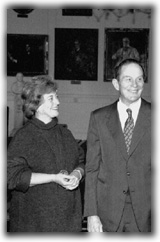![]()
Main Menu · Search
· Current Issue · Contact
· Archives · Centennial
· Letters to the Editor · FAQs
![]()
Main Menu · Search
· Current Issue · Contact
· Archives · Centennial
· Letters to the Editor · FAQs
 Celia
and Albert Weatherhead HARVARD NEWS OFFICE Celia
and Albert Weatherhead HARVARD NEWS OFFICE |
The University's ambitious effort to expand research and professional education on global issues advanced markedly with a $21-million gift from Albert J. Weatherhead III '50, B '52, Celia S. Weatherhead, and the Weatherhead Foundation. Announced November 5, the gift will support the Center for International Affairs (CFIA), which was founded by Henry Kissinger '50, Ph.D. '54, and others in 1958 and will now be renamed in the Weatherheads' honor.
President Neil L. Rudenstine, who has made a "substantially expanded and very robust international agenda" a high priority in the University Campaign, said the CFIA gift "could not be more welcome." It follows funds secured in recent years for the Korean, Latin American, and Russian research centers, and for Islamic legal studies at the Law School.
With a pledge of $15 million from Sidney R. Knafel '52, M.B.A. '54, for a new Center for Government and International Studies ("Building Boom," January-February 1997, page 58), and a like amount yet to be secured for a new building for the government department, Harvard is nearing a $100-million investment in enhancing what Rudenstine calls a "unique gathering of regional institutes, hooked together with international and government studies."
The Weatherhead funds enable Harvard to "expand its problem-solving research on major world issues, train future world leaders, and develop the next generation of international-relations scholars," according to the CFIA's director, Jorge I. Dominguez, Ph.D. '72, Dillon professor of international affairs.
A new international-relations initiative will assemble teams of scholars and practitioners annually to conduct research on problems such as human-rights emergencies or the coordination of national exchange rates. An endowment for the center's fellowship program, which brings 20 senior diplomats, military officers, and other foreign leaders to Harvard each year, will make it possible to support candidates from poorer nations and to broaden the pool to include finance ministers and other newly influential international policymakers. Finally, the Harvard Academy for International and Area Studies, which brings promising young scholars, both foreign and domestic, to the center for two years of study and training, will enlarge its enrollment. Its director is Weatherhead University Professor Samuel P. Huntington, Ph.D. '51, who holds one of four chairs previously established by the Weatherheads.
As for the latest gift, Albert Weatherhead says, "We are trying to create a world that is healthier, happier, more cooperative, and with less stress and strife."